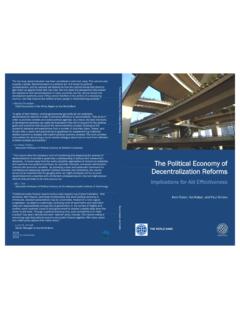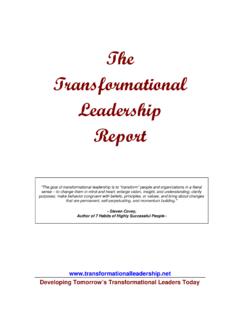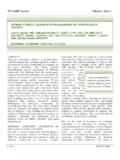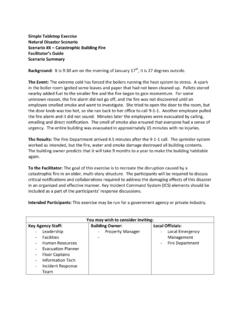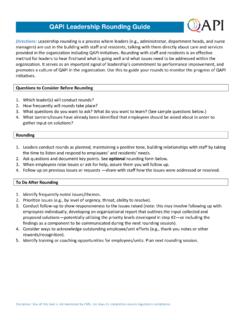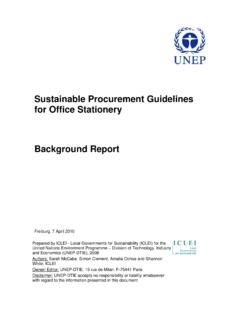Transcription of Background Notes on Leadership - World Bank
1 The WBI Leadership Development ProgramLeadership Matters Background Notes on Leadership Background Notes on Leadership The World Bank Institute Leadership Development Program World Bank Washington, DC Copyright 2007 The International Bank for Reconstruction and Development /The World Bank 1818 H Street, Washington, 20433, This document has not undergone the review accorded to official World Bank publications. The findings, interpretations, and conclusions expressed herein are those of the author(s) and do not necessarily reflect the views of the International Bank for Reconstruction and Development / The World Bank and its affiliated organizations, or those of the Executive Directors of The World Bank or the governments they represent. The World Bank does not guarantee the accuracy of the data included in this work.
2 The boundaries, colors, denominations, and other information shown on any map in this work do not imply any judgment on the part of The World Bank concerning the legal status of any territory or the endorsement or acceptance of such boundaries 2 Contents 1. Purpose of 4 2. What can we Generalize about Leadership ?.. 5 3. Leadership Development: Going beyond the Individual .. 6 4. Rethinking the Leadership Development 9 5. Strengthening the Focus on 11 6. Leadership Development: Targeting 14 7. Evaluating Leadership 16 31. Purpose of Document These Notes reflect work in progress and are provided solely for the information of the participants in Capacity Day 2007. The Notes cover some of the issues that will be discussed during the event and are intended as a starting point for further dialogue and discussion and not to provide conclusions.
3 42. What can we Generalize about Leadership ? Some 2500 years ago Socrates argued that Leadership is always situational: a leader has qualities and especially professional or technical knowledge that are specific to the situation, hence not transferable. But he also argued the other side of the coin: a good business leader, he said, would also make a good military commander for both shared certain generic Leadership skills such as being good at choosing the best people to work with, and being able to identify and work with the right allies. Knowledge about Leadership accumulated through decades of research into Leadership issues seems to suggest that certain Leadership characteristics that are useful in one field or culture are likely to be useful in another. If this is in fact the case, then despite significant regional differences, we would in principle be able to design courses and programs which especially with tailored alterations would be effective in any part of the World .
4 Three basic building blocks of a good leader or generic Leadership skills may include the following: (i) The capacity to develop and mobilize stakeholders around a shared vision; (ii) The ability to ensure effective translation of that vision into concrete outcomes; and (iii) A commitment to integrity and ethics and the practice of accountability. Decades of work on Leadership issues have however also yielded an emerging understanding of Leadership as an institutional issue, not just the issue of the skills and attributes of an (exceptional) individual. Leadership never takes place in a void, but always in a particular context. For some providers of Leadership development services, this context is at country level, and what matters most here - according to decades of experience - are the institutions and values that shape a country s governance.
5 A symbiotic relationship exists between the quality of a country s Leadership and the quality of its governance. Donors who are committed to help a country fulfill its own vision are likely to be interested then in supporting Leadership programs that are not limited to training individuals but which also address capacity constraints systemically at other levels. This is in line with the New Partnership Model that is emerging for development assistance and which is likely to guide much of the development assistance in the future. 53. Leadership Development: Going beyond the Individual Issue The demand for Leadership training is significant. The supply of Leadership training is vast. Access to scholarly books, journals, and website information is easy, if not overwhelming.
6 Yet the demand for Leadership training and capacity building continues. Most Leadership programs focus on the broad range of identified Leadership competencies. In this note, it is suggested that public sector Leadership training must focus on the environments within which leaders work, not only on the competencies required to effectively navigate those environments. Introduction Leadership is a key factor in good governance and the successful implementation of public sector mandates. Public sector leaders work in uniquely complex environments with multiple stakeholders and demands. In addition, some public sector leaders are working in environments with the further challenges of major conflict, significant poverty and/or limited development. In recent years accountability has been at the heart of sound Leadership practices1.
7 Leadership competencies have been identified and corresponding training developed and delivered worldwide. What is less common is Leadership development focused on the environmental or institutional challenges of public sector leaders. These challenges are linked to the unique and special environments within which public sector leaders are working - the term and life cycle of government, the specific role of the leader, and the historical or cultural pattern of Leadership within a given government. Leadership development needs to focus on political visions, specific strategies and timetables, as well as individual management and technical roles, in order to carry weight and sustain impact2. Leadership development: considerations The Leadership development challenges facing the provider of such services are significant: Leaders are generally well educated and have been trained formally, frequently and variously on the many Leadership competencies; Leaders are busy and the demands on them are multi-faceted; Leadership in the public sector is complex and Leadership demands are immediate; Leadership training must be timely and relevant.
8 1 UNDP. Leadership for Human Development: A UNDP Capacity Development Resource. June 2006. 2 Ibid. 6A stylized approach to Leadership development In recognition of the existing supply of Leadership development programs and the challenges noted above, there are a number of different institutional approaches to Leadership development. Although some variations are required to accommodate unique political situations, a typical approach would focus on the practical needs within the context of the life cycle of government, which may be described as follows: Preparation for a government transition: Transitions of power represent a critical moment in our democratic systems3. Public sector leaders can contribute to a new government s smooth assumption of power by effectively anticipating their interests and preparing for their needs.
9 A well planned and executed transition also contributes to the establishment of positive working relationships based on mutual trust and respect, and the public sector credibility necessary for effective planning and implementation of a new agenda; Prioritization and communication of a new government s agenda: Elections generate promises and raised citizens expectations. New governments must prioritize and communicate quickly and effectively within the context of fiscal and practical realities. Policy, program and service implementation for results: Citizens anticipate rapid results. Identifying and managing the changes needed to ensure real and concrete results within the life cycle of the government may constitute one of the greatest challenges for public sector leaders.
10 Ensuring a legacy: Political leaders expect to make a difference. The assurance and effective communication of legacy achievements demonstrates real Leadership . Tools for Leadership development In order to effectively respond to these varying issues and demands, Leadership development programs need to be individually and uniquely designed, with topics chosen to relate to specific partner priorities. The competencies that are required to address immediate commitments and challenges should be targeted. Further, such programs need to be innovative and flexible. Tools and instruments that may be used for Leadership development include: Peer-to-peer learning; Practitioner-to-practitioner arrangements; Access to best practice and lessons learned in other countries; Twinning; Mentoring; Coaching; Access to knowledge and information; Access to global networks; Case studies; 3 Donald J.




